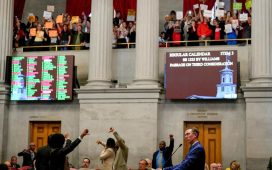If the Kentucky Supreme Court doesn’t reconsider its recently-published surprise opinion on the legality of historical horse racing (HHR) machines in the state, Kentucky’s racing industry will be in big trouble.
That’s the gist of a document filed in the case this week by the Kentucky Thoroughbred Association (KTA). The KTA is seeking permission to file a brief of amicus curiae in the civil case between The Family Trust Foundation of Kentucky and the Kentucky Horse Racing Commission. Last month, the state supreme court reversed a 2018 lower court decision that determined HHR machines made by Exacta Systems were a form of legal pari-mutuel wagering.
The Kentucky Chamber of Commerce also submitted an amicus brief last week, expressing concern over the potential economic impact of the court’s decision.
The KTA provided figures showing an upward improvement in all sectors of the state’s racing and breeding industry since the introduction of HHR machines in 2012. The Kentucky Thoroughbred Development Fund is generated from half of the 1.5 percent excise tax imposed on wagering at tracks with HHR. The fund paid out purse supplements of just over $4.9 million in the year before the inception of HHR in Kentucky, and over $19.5 million last year.
The KTA’s brief explains that this increase in purses has led to an increase in field size (which is above the national average) and handle (which increased 18.5 percent with the addition of HHR).
“Eliminating historical horse racing will have a significant negative effect on the Thoroughbred horse industry, which, again, is Kentucky’s signature industry,” the brief read. “It will result in horses, trainers, jockeys, grooms, owners, racing executives, and other industry participants going to other states to compete. Kentucky will lose tourism dollars. Kentucky will lose revenue from on-track sources and also from off-track (and in many cases out of state) sources.
“In addition, reducing the KTDF purse supplements will reduce the purses, which will reduce the amount owners will be willing to pay for Kentucky-bred horses that are eligible to race for these supplements. This will lead to decreased spending on yearlings sold in Kentucky each year. It will lead to decreased spending on mares and stallions sold in Kentucky each year. It will lead to fewer mares being maintained in Kentucky. All of this would lead to decreased tax revenue, decreased employment, decreased tourism spending, and decreased economic impact. In short, Kentucky’s signature industry would suffer and Kentucky racing would trend the way racing in other states is trending: downward.”
The KTA also raises questions about the legal elements of the Family Foundation’s case and whether the court correctly interpreted definitions of pari-mutuel wagering, initial seed pools, and the commission’s regulatory authority, among other things.
New to the Paulick Report? Click here to sign up for our daily email newsletter to keep up on this and other stories happening in the Thoroughbred industry.
Copyright © 2020 Paulick Report.







